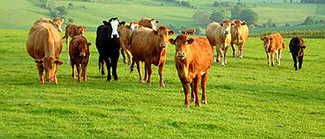







These have their own distinct characteristics. When dealing with Southeastern hides, there is one important thing to remember, the farther South you go, the lighter the average weights. However, they vary with seasons, being lightest in the summer.
Southeastern hides usually have a smaller percentage of grubs than those in some other parts of the country. As far as grubs are concerned, the farther South you go, the earlier the grub season starts and, by the same token, the sooner it ends. Florida is the exception. There you find only a small percentage of grubs, even in the grubbiest season.
What is the line of demarcation to indicate the start of the Southeastern States? What states come within the trade terminology of the "Southeast"? Starting from the north and going southward, the following states are sometimes referred to as Northern/Southern: West Virginia, Virginia, Kentucky, (which is included with some reservation), North Carolina, and Tenessee. After these, come the genuine Southeastern States: South Carolina, Alabama, Georgia, and Florida. Then, there is a fringe which is included, more or less, when we talk about Southeastern hides. In this fringe area, are: Mississippi, Louisiana, and the eastern part of Arkansas.
Before going into the outstanding characteristics of hides originating in this specific area (the Southeast), I should like to point out that there is no fixed rule and that there are always exceptions. However, starting with the Northern/Southern, these hides usually have good grain and are rather plump. Generally speaking, the farther South we go, the thinner the hides become and the less good grain we find.
In the western portion of the Southeast, such as Mississippi, Arkansas, and a part of Louisiana, we come up with a plump hide of small pattern, somewhat similar to those found in the neighboring state of Texas.
While Florida has fewer grubs, it has more brands than any of the other Southeastern States.
While the average weights get lighter the farther South we go, we should point out that they vary with the seasons, being lightest in the summer. Kentucky, especially the Louisville area, has the heaviest average. Tennessee comes next. However, as we said before, there are no fixed rules and the deductions we have made refer only to packing plants which kill the average raised in their immediate areas.
However, we know this isn't always the case. Frequently you will find two neighboring packing plants which have entirely different descriptions of hides. There are packers which kill mostly canners and cutters for the sausage industry, and others who slaughter only the best cattle for the hotel and restaurant trade. While tanners generally know what to expect when they buy hides from the same sections throughout the year, still they are disappointed at times when packers who usually kill about 15 to 20 percent canners and cutters come up with 40 to 50 percent.
Some packers in the Southeast put up hides quite differently from the usual selections in big packer plants. Light hides, in a weight range of 30/53 lbs., are all put up in one pack without a separation of sexes. The usual way to separate steers is in weight ranges of 30/48, 48/58, and 58 and up, and cows 30/53, and 53 and up. In Southeastern plants, procedure is to put all hides, whether they are cows, steers, heifers, or bulls, ranging, as mentioned, 30/53 into one pack.
(Source: Hides & Skins. National Hide Association. Pages 143-144)